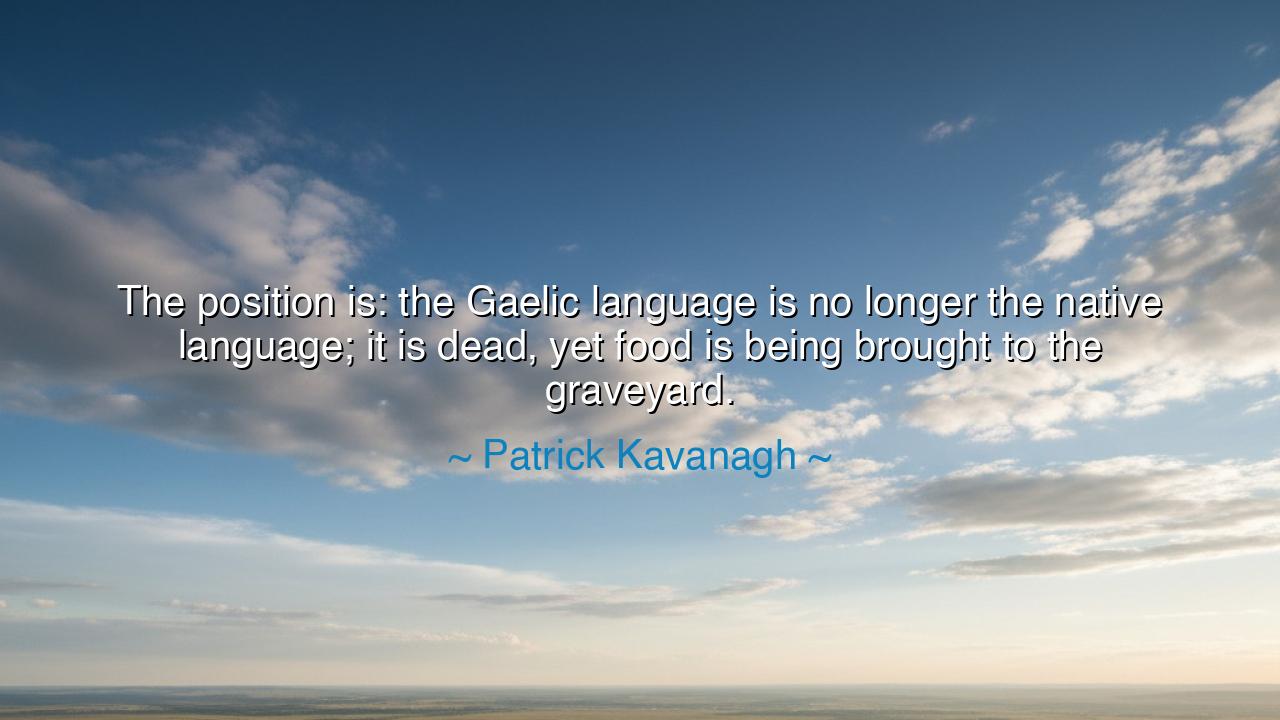
The position is: the Gaelic language is no longer the native
The position is: the Gaelic language is no longer the native language; it is dead, yet food is being brought to the graveyard.






The gentle hum of the café filled the air, blending with the rhythmic tapping of rain against the window. Jack sat across from Jeeny, his coffee cup cradled in his hands, staring out at the rain-soaked streets. Jeeny, sitting opposite him, seemed lost in thought, her fingers lightly tracing the rim of her cup.
Host: After a moment of silence, Jeeny spoke, her voice reflective, but with a hint of curiosity.
Jeeny: “I came across a quote by Patrick Kavanagh today that really struck me. He said, ‘The position is: the Gaelic language is no longer the native language; it is dead, yet food is being brought to the graveyard.’ What do you think he means by that? Do you think he’s commenting on the preservation of tradition in a world that’s moved on?”
Jack: He looked up, considering her words. “I think Kavanagh is speaking about the paradox of trying to hold onto something that no longer serves its original purpose. The Gaelic language, for instance, is no longer the living, spoken language of the people, yet there’s an effort to preserve it as though it still has the same relevance it once did. He’s suggesting that we’re trying to keep something alive that has already passed, much like bringing food to a graveyard—it’s a futile gesture because the essence of what was once vibrant is no longer there.”
Jeeny: “Exactly. It’s like trying to preserve something out of nostalgia or obligation, even when its true function has been lost. Language, culture, and traditions are meant to evolve with the people who practice them. When they no longer serve or resonate with the community, trying to revive them can feel artificial—like feeding something that’s already gone, trying to resurrect a part of the past that no longer holds meaning.”
Host: The rain outside had softened, leaving a quiet stillness between them. Jack shifted slightly, his fingers still resting on his coffee cup as he continued.
Jack: “I think Kavanagh’s comment is also about the struggle between preservation and progress. We often feel the need to preserve traditions and languages because they’re a part of our identity, but sometimes that preservation can turn into a kind of symbolic gesture that doesn’t really reflect the lived reality. In a world that’s constantly evolving, it’s difficult to know when to hold on to the past and when to let it naturally fade. There’s a tension between honoring tradition and embracing change.”
Jeeny: “Yes, and I think it’s also about relevance. A tradition or language might have served a certain purpose in the past, but as the world changes, so do the ways we communicate, connect, and understand each other. Trying to preserve something in the same way can feel like we’re clinging to an idea that no longer fits the needs of the present moment. It’s not that it doesn’t matter—it’s that it needs to evolve or be understood in a different context.”
Host: The conversation seemed to deepen, as they both reflected on the complexities of tradition and progress. Jack set his coffee cup down gently, his expression softening.
Jack: “Exactly. And I think Kavanagh is pointing out that there’s a fine line between respecting the past and holding on too tightly to it. Preserving something out of love or respect is one thing, but when it becomes a matter of ritual or formality, it can lose its true meaning. In trying to keep it alive, we might miss the point of what made it vibrant in the first place.”
Jeeny: Her smile was small but filled with understanding. “Exactly. The challenge is finding a way to honor the past while still moving forward and adapting. Sometimes, the best way to keep something alive is to allow it to evolve with the times, not to simply try to recreate it as it once was. It’s about living the tradition, not just preserving it.”
Host: The rain had stopped, leaving a quiet calm in the air. Inside, Jack and Jeeny sat in the realization that Kavanagh’s words are a reminder of the delicate balance between tradition and progress. While we may feel the need to preserve the past, it’s important to recognize when something has outlived its original purpose. True preservation isn’t about bringing food to the graveyard; it’s about living the tradition in a way that keeps it meaningful in the present. It’s about finding the right balance between honoring the past and embracing change.






AAdministratorAdministrator
Welcome, honored guests. Please leave a comment, we will respond soon